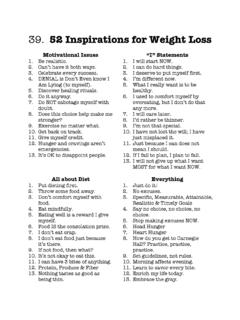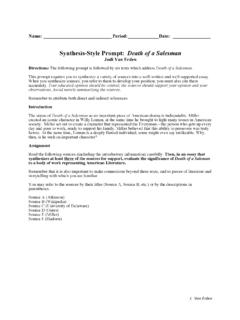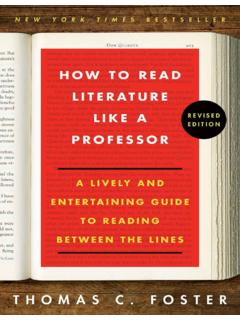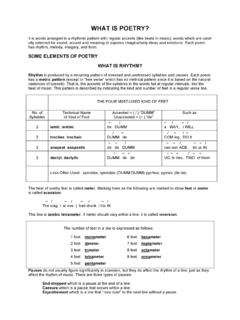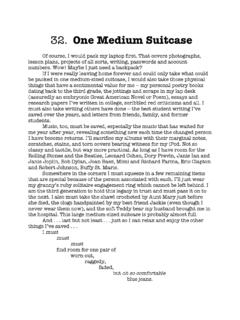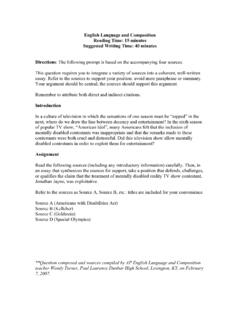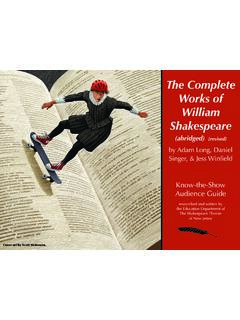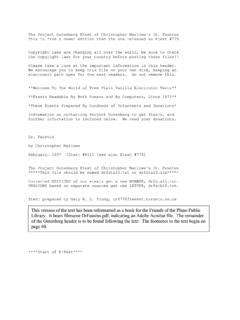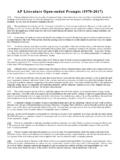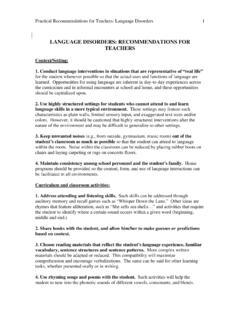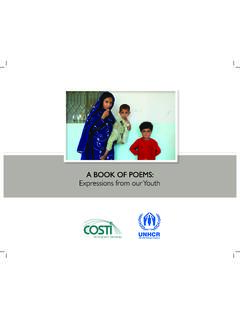Transcription of Poetry Essays With Poems - MsEffie
1 MsEffiMsEffie s Liste s List of Poetry Essay Promptsof Poetry Essay Prompts for Advanced Placement Engfor Advanced Placement English lish Literature Exams, 1970 Literature Exams, 1970--20192019** *Advanced Placement is a trademark registered by the College Board, which is not affiliated with, and does not endorse, this website. Each poem is included in the following prompts, printed on separate pages for better use in the classroom. None of the prompts are original to me, but are Advanced Placement English Literature and Composition Exam prompts. This is my best effort to comply with College Board s use requirements. 1970 Poem: Elegy for Jane (Theodore Roethke) Prompt: Write an essay in which you describe the speaker s attitude toward his former student, Jane. Elegy for Jane by Theodore Roethke I remember the neckcurls, limp and damp as tendrils; And her quick look, a sidelong pickerel smile; And how, once startled into talk, the light syllables leaped for her, And she balanced in the delight of her thought, 5 A wren, happy, tail into the wind, Her song trembling the twigs and small branches.
2 The shade sang with her; The leaves, their whispers turned to kissing, And the mould sang in the bleached valleys under the rose. 10 Oh, when she was sad, she cast herself down into such a pure depth, Even a father could not find her: Scraping her cheek against straw, Stirring the clearest water. My sparrow, you are not here, 15 Waiting like a fern, making a spiney shadow. The sides of wet stones cannot console me, Nor the moss, wound with the last light. If only I could nudge you from this sleep, My maimed darling, my skittery pigeon. 20 Over this damp grave I speak the words of my love: I, with no rights in this matter, Neither father nor lover. 1971 Poem: The Unknown Citizen ( Auden) Prompt: In a brief essay, identify at least two of the implications implicit in the society reflected in the poem. Support your statements by specific references to the poem. The Unknown Citizen by Auden He was found by the Bureau of Statistics to be One against whom there was no official complaint, And all the reports on his conduct agree That, in the modern sense of an old-fashioned word, he was a saint, 5 For in everything he did he served the Greater Community.
3 Except for the War till the day he retired He worked in a factory and never got fired, But satisfied his employers, Fudge Motors Inc. Yet he wasn t a scab or odd in his views, 10 For his Union reports that he paid his dues, (Our report on his Union shows it was sound) And our Social Psychology workers found That he was popular with his mates and liked a drink. The Press are convinced that he bought a paper every day 15 And that his reactions to advertisements were normal in every way. Policies taken out in his name prove that he was fully insured, And his Health-card shows he was once in hospital but left it cured. Both Producers Research and High-Grade Living declare He was fully sensible to the advantages of the Installment Plan 20 And had everything necessary to the Modern Man, A phonograph, a radio, a car and a frigidaire. Our researchers into Public Opinion are content That he held the proper opinions for the time of year; When there was peace, he was for peace; when there was war, he went.
4 25 He was married and added five children to the population, Which our Eugenist says was the right number for a parent of his generation. And our teachers report that he never interfered with their education. Was he free? Was he happy? The question is absurd: Had anything been wrong, we should certainly have heard. 1976 Poem: Poetry of Departures (Philip Larkin) Prompt: Write an essay in which you discuss how the poem s diction (choice of words) reveals his attitude toward the two ways of living mentioned in the poem. Poetry Of Departures by Philip Larkin Sometimes you hear, fifth-hand, As epitaph: He chucked up everything And just cleared off, 5 And always the voice will sound Certain you approve This audacious, purifying, Elemental move. And they are right, I think. 10 We all hate home And having to be there: I detest my room, It s specially-chosen junk, The good books, the good bed, 15 And my life, in perfect order: So to hear it said He walked out on the whole crowd Leaves me flushed and stirred, Like Then she undid her dress 20 Or Take that you bastard; Surely I can, if he did?
5 And that helps me to stay Sober and industrious. But I d go today, 25 Yes, swagger the nut-strewn roads, Crouch in the fo c sle Stubbly with goodness, if It weren t so artificial, Such a deliberate step backwards 30 To create an object: Books; china; a life Reprehensibly perfect. 1977 Poem: Piano [2 Poems with the same name] (D. H. Lawrence) Prompt: Read both Poems carefully and then write an essay in which you explain what characteristics of the second poem make it better than the first. Refer specifically to details of both Poems . (1) Piano by D. H. Lawrence Somewhere beneath that piano s superb sleek black Must hide my mother s piano, little and brown, with the back That stood close to the wall, and the front s faded silk both torn, And the keys with little hollows, that my mother s fingers had worn. 5 Softly, in the shadows, a woman is singing to me Quietly, through the years I have crept back to see A child sitting under the piano, in the boom of the shaking strings Pressing the little poised feet of the mother who smiles as she sings.
6 The full throated woman has chosen a winning, living song 10 And surely the heart that is in me must belong To the old Sunday evenings, when darkness wandered outside And hymns gleamed on our warm lips, as we watched mother s fingers glide. Or this is my sister at home in the old front room Singing love s first surprised gladness, alone in the gloom. 15 She will start when she sees me, and blushing, spread out her hands To cover my mouth s raillery, till I m bound in her shame s heart-spun bands. A woman is singing me a wild Hungarian air And her arms, and her bosom, and the whole of her soul is bare, - And the great black piano is clamouring as my mother s never could clamour 20 And my mother s tunes are devoured of this music s ravaging glamour. (2) Piano by D. H. Lawrence Softly, in the dusk, a woman is singing to me; Taking me back down the vista of years, till I see A child sitting under the piano, in the boom of the tingling strings And pressing the small, poised feet of a mother who smiles as she sings.
7 5 In spite of myself, the insidious mastery of song Betrays me back, till the heart of me weeps to belong to the old Sunday evenings at home, with the winter outside And hymns in the cosy parlour, the tinkling piano our guide. So now it is vain for the singer to burst into clamour 10 With the great black piano appassionato. The glamour Of childish days is upon me, my manhood is cast Down in the flood of remembrance, I weep like a child for the past. 1978 Poem: Law Like Love ( Auden) Prompt: Read the poem and the write an essay discussing the differences between the conceptions of law in lines 1-34 and those in lines 35-60. Law Like Love by W. H. Auden Law, say the gardeners, is the sun, Law is the one All gardeners obey To-morrow, yesterday, to-day. 5 Law is the wisdom of the old, The impotent grandfathers feebly scold; The grandchildren put out a treble tongue, Law is the senses of the young.
8 Law, says the priest with a priestly look, 10 Expounding to an unpriestly people, Law is the words in my priestly book, Law is my pulpit and my steeple. Law, says the judge as he looks down his nose, Speaking clearly and most severely, 15 Law is as I ve told you before, Law is as you know I suppose, Law is but let me explain it once more, Law is The Law. Yet law-abiding scholars write: 20 Law is neither wrong nor right, Law is only crimes Punished by places and by times, Law is the clothes men wear Anytime, anywhere, 25 Law is Good morning and Good night. Others say, Law is our Fate; Others say, Law is our State; Others say, others say Law is no more, 30 Law has gone away. And always the loud angry crowd Very angry and very loud, Law is We, And always the soft idiot softly Me. 35 If we, dear, know we know no more Than they about the Law, If I no more than you know what we should and should not do Except that all agree 40 Gladly or miserably That the Law is And that all know this If therefore thinking it absurd To identify Law with some other word, 45 Unlike so many men I cannot say Law is again, No more than they can we suppress The universal wish to guess Or slip out of our own position 50 Into an unconcerned condition.
9 Although I can at least confine Your vanity and mine To stating timidly A timid similarity, 55 We shall boast anyway: Like love I say. Like love we don t know where or why, Like love we can t compel or fly, Like love we often weep, 60 Like love we seldom keep. 1979 Poems : Spring And All (William Carlos Williams) and For Jane Meyers (Louise Gluck) Prompt: Read the two Poems carefully. Then write a well-organized essay in which you show how the attitudes towards the coming of spring implied in these two Poems differ from each other. Support your statements with specific references to the texts. Spring and All by William Carlos Williams By the road to the contagious hospital under the surge of the blue mottled clouds driven from the northeast a cold wind. Beyond, the 5 waste of broad, muddy fields brown with dried weeds, standing and fallen patches of standing water the scattering of tall trees All along the road the reddish 10 purplish, forked, upstanding, twiggy stuff of bushes and small trees with dead, brown leaves under them leafless vines Lifeless in appearance, sluggish 15 dazed spring approaches They enter the new world naked, cold, uncertain of all save that they enter.
10 All about them the cold, familiar wind 20 Now the grass, tomorrow the stiff curl of wildcarrot leaf One by one the objects are defined It quickens: clarity, outline of leaf But now the stark dignity of 25 entrance Still, the profound change has come upon them: rooted they grip down and begin to awaken For Jane Meyers by Louise Gluck Sap rises from the sodden ditch glues two green ears to the dead birch twig. Perilous beauty and already Jane is digging out 5 her colored tennis shoes, one mauve, one yellow, like large crocuses. And by the laundromat the Bartletts In their tidy yard as though it were not - 10 wearying, wearying to hear in the bushes the mild harping of the breeze, the daffodils flocking and honking Look how the bluet* falls apart, mud 15 pockets the seed.
